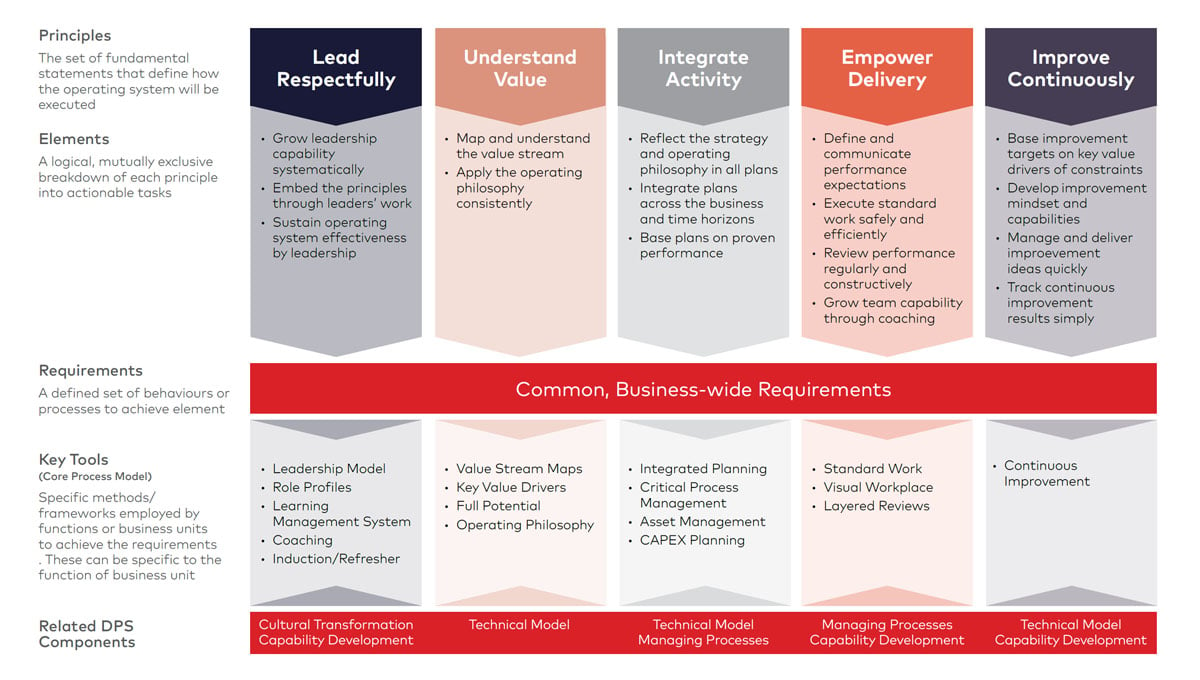Transform Holistically for a More Efficient and Sustainable Future
A nimble, principles-based Operating System is critical to oil, gas and new energy companies transforming at pace to meet the myriad of concurrent challenges they face.

In the long history of the oil and gas industry, never have companies faced so many competing priorities and challenges - all leading to pressure to transform at pace.
- High risk, high fatality rates
The global industry fatality rate remains seven times higher than averages. Oil, gas and energy sites are dynamic, and risks may change from hourto- hour, day-to-day, week-to-week. Continuously improving fatal risk controls is a strategic priority in a sector which rightly places safety as a core value. - Challenging economic climate
Production has been relatively flat whilst operating costs are increasing at rates unseen in recent times. Indeed, global oil and gas production has nearly plateaued in 2022 so far, whilst global inflation is forecast to reach 8%. Improving the top and bottom-line performance of operating assets is critical to protect margin. - Reduced capital funding
The competition for capital to fund the extension of existing or new assets has never been greater. Why? More than 80 global financial institutions have announced they will restrict lending to the sector. More than 100 have announced their divestment altogether. - Increasing social pressures
Negative public sentiment coupled with government intervention continues to grow. Tangible roadmaps must underpin decarbonisation targets. Stakeholders must be engaged. This will allow the industry to prove how it will contribute to overall net zero targets. - Disengaged talent
The war for talent is fierce. The oil price crash of 2020 triggered 107,000 layoffs across the industry in the US alone, with a similar trend felt across the globe. This adversely affected the industry’s reputation as a reliable employer.
In the midst of this sweeping disruption, current geopolitical tension combined with oil demand being nearly back to pre-COVID-19 levels have resulted in an oil price recovery to $100/bbl. In other words, oil, gas and new energy businesses have cash flow to invest in their future now.
Our recommendation
Riding the oil price cycle and taking a piecemeal approach to transformation is no longer a viable operating strategy. An integrated approach is required – to improve safety, risk, unit cost, growth, and decarbonisation performance concurrently, whilst making new energy assets viable.
This is the challenge oil, gas and new energy organisations face now. Those getting ahead of the game will have a significant competitive advantage.
Critical Success Factors to an integrated transformation programme
Critical to this integrated approach is a nimble, well-designed Operating System.
Operating systems are not new to the oil, gas and new energy industry; far from it. However, dss+ has witnessed first-hand the limited effectiveness many of them have in enabling businesses to transform holistically and at pace. This can be reversed.
What are the pitfalls to avoid?
Four common pitfalls have been shown to limit these systems’ effectiveness.
Under-investment in defining the leadership traits and styles required to deliver business transformation, and then in appointing the right leaders to the right roles.
Lack of definition and alignment on how each organisation needs to operate holistically to achieve its business output KPIs such as TRIFR, Unit Cost, Capital $s, and GHG Emissions. Instead, many organisations operate in silos; these safety, risk, production, cost, and emissions KPIs become metrics to be recorded, rather than key value drivers that shift performance.
Excessive focus on innovation, process automation and outsourcing to the detriment of safety, production, cost, and emissions performance fundamentals.
Insufficient organisational capacity to drive and absorb improvement. Improvement programs need to be highly targeted, with a focus on driving the critical few initiatives to improve safety, risk, production, cost, and emissions performance.
| What is an Operating System? An operating system is an enterprise-wide set of processes and interfaces that drive the business towards its full potential. dss+ believes that to enable the business to transform at pace, the system should be nimble, principles-based and encompass human factors. |
The key? A principles-based system.
High-performing organisations embed principles-based (vs tool-based) operating systems that are continuously improved and span multiple generations of leadership.
A principles-based operating system drives improvement at pace by embedding inspiring leaders in critical roles, empowering teams, integrating all activities, delivering predictable performance, and then transforming the business through innovation and continuous improvement.
We utilise the dss+ operating system blueprint as a starting point with our clients. It contains five principles, which are broken down into elements and performance requirements, and supported by key tools and processes.
Distinctively, this blueprint does not solely tackle processes. Rather, it concurrently embraces human factors to build internal capability and effect cultural change. This ensures change is sustained over the long term.
We have successfully leveraged this approach with multiple oil, gas and new energy clients. Amongst others, dss+ partnered with a global organisation to deliver a reduction in tier 1 and tier 2 safety events, reduce business operating expenditure by US$90m, reduce capital expenditure by US$20m, and deliver an additional 350,000boe above budget at a critical asset.

In conclusion
At a time when the oil, gas and new energy industry faces so many concurrent, strategic challenges, your Operating System should be a key driver of business performance. It must be nimble, encompass both processes and human factors, and apply to all business units consistently.
Ultimately, it is a foundational tool which will help you:
- Protect the short-term and long-term viability of your company.
- Transform your organisation holistically in a planned, efficient fashion.
- Sustain that change thanks to the high-performing, consistent culture and processes you will have created.
Contributing to this paper were:



